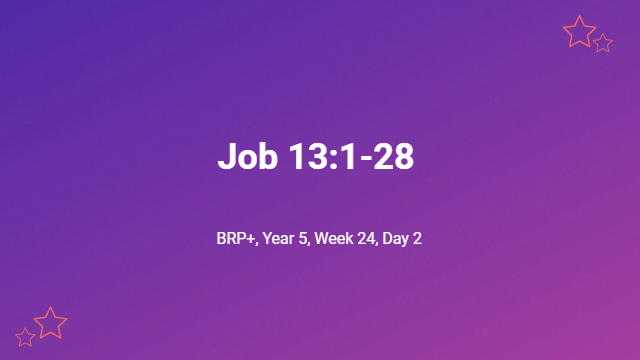Job 13:1-28
Q.1. How did the responses of Job’s friends affect him? Did he accept that they were speaking accurately for God? How would their arguments be judged by God? – (Job 13:1-12)
We only have the words recorded in the book of Job, and not the non-verbal communications. However, Job’s friends talked down at him, and smeared him, using lies. Job responded – … I am not inferior to you (Job 13:2 c.f. Job 13:4; 12:3). He pleaded to be able to argue his case with God directly, since He would not be unjust or deceitful. Nor would He show partiality, as they were doing (Job 13:7-8). God would expose their talk as being as worthless as ashes and clay, and He would fill them with dread for slandering a godly man.
Q.2. How real was Job’s faith in God? Did he consider that to argue his case with God was out of bounds? Was he confident of being vindicated before God? – (Job.13:13-19 c.f. Jer.20:7-13)
Job gave them the bottom line of his belief system – “Though He slay me, I will hope in Him. Nevertheless I will argue my ways before Him (Job 13:15). His faith did not dismiss his right for an explanation from God. His view of God was that a godly man could make his appeal before God, as Abraham, Moses, and Jeremiah had done, when challenged by their circumstances that had been ordered by God (Job 13:16-19 c.f. Gen.18:23-33; Ex.32:11-14; Jer.20:7-13). Having had ample time to search his own heart, Job declared – I know that I will be vindicated (Job 13:18).
Q.3. What was Job’s request from God? In what condition was Job? What did he long for God to do for him? – (Job.13:20-28)
Job had a twofold request from God – 21 Remove Your hand from me and let not the dread of You terrify me. 22 “Then call, and I will answer; Or let me speak, then reply to me (Job 13:21-22). These are two experiences none of us find easy to endure – for God to withhold His explanation for our suffering, or for God to overwhelm us with a list of all our offenses against Him. Job longed for a reason to make sense of his suffering, and for an indication of the sins for which he was being punished. Without such an explanation it seemed he was being treated like the enemy, not a servant of God (Job 13:23-24 c.f. Job 1:8; 2:3). Job did not understand why his friends were allowed to bring such unjust accusations against him, when he was trapped in his lamentable state. (Job 13:25-28).

